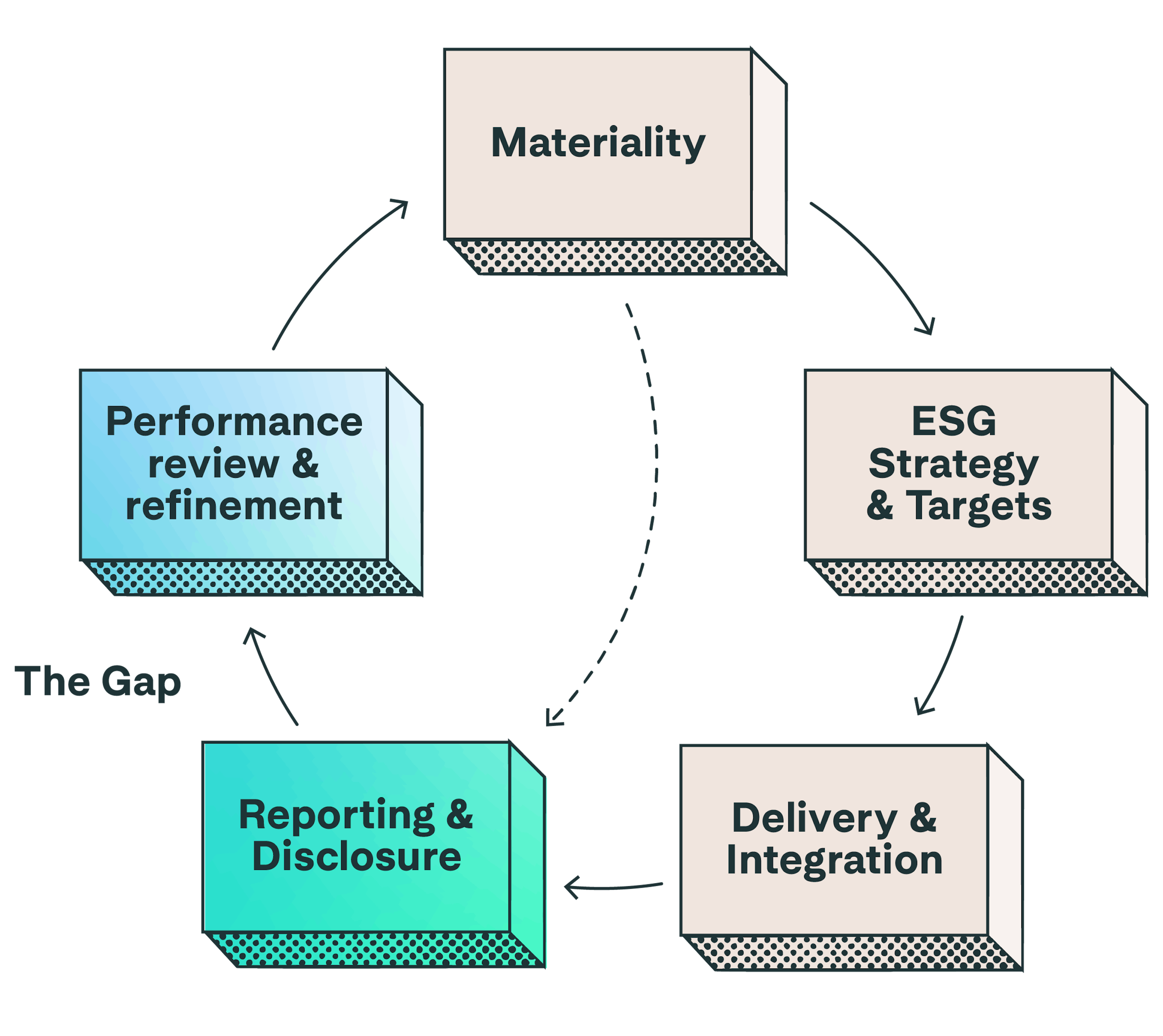
Leadership in the Age of Disclosure
Written by
Kaitlin Roney, Managing Consultant, Sustainability Leadership and Transformation
We're in the age of disclosure.
A period where over 97% of Australia’s largest companies and over 92% of the S&P 500 are publishing detailed sustainability reports or providing updates against ESG metrics. There is more information on the sustainability performance of organisations available now than there has been ever before.
In theory these disclosures, and the surplus of information they provide, could and should be used to inform decision making, facilitate the flow of capital and bolster strategic efforts towards the achievement of net zero.
Historically, it has been reporting and disclosure that has driven progress towards more sustainable practices driven by investor, customer, government and stakeholder expectations and pressure.
As sustainability literacy among these audiences increases, the disclosure burden on organisations has grown, along with the volume of data required in reports. The result, while somewhat overwhelming for organisations, is a necessary step in the process to driving increased accountability and progress towards net zero.
In moving past this gridlock it’s critical that organisations reframe their view of sustainability reporting as just a regulatory obligation and begin to look at it as a powerful catalyst for transformation and means to inform the decisions that drive change.
Overcoming challenges: reframing sustainability reporting
When making this shift, it's critical to prioritise transparency and balance in disclosure, and for organisations to be more forthcoming about perceived 'failures' or falling short of targets. In sharing a more balanced picture of their progress, organisations create learning, engagement and partnership opportunities and the chance to review and recalibrate to drive further change.
If we consider the process organisations undergo when embarking on their sustainability journey, for many, they are skipping a vital step.

In doing so they are missing a critical opportunity to use the data and insights gained from the reporting process to facilitate behaviour change, inform decision making and drive continuous improvement across their organisations and beyond.
In an environment where over 90% of organisations are already on track to miss their net-zero targets, it is critical to close the gap between strategy, reporting and progress.
But how do we do this effectively?
Discover where you stand on the sustainability scale and chart your path forward with our Bridging the Gap Whitepaper. Download it here.
The Four Scales of Leadership
Connecting the dots between disclosure and action requires sustainability to be integrated into all levels of an organisation.
To do this we can use the Four Scales of Leadership. This model looks at the spheres of influence within which we can use data to facilitate change.

- The Individual leadership sphere looks at the skills, capabilities, and influence individuals (including employees and consumers) have and need to help organisations achieve their sustainability goals.
- The Team Leadership level looks at how we organise ourselves around sustainability to make decisions and deliver initiatives that drive progress and achieve more sustainable outcomes.
- From an Organisational standpoint, its beneficial to review how an organisation has embedded sustainability into how it thinks, acts, shows up and measures success in line with its sustainability targets and goals, and whether an organisation needs to undergo a transformation to be more aligned.
- The Societal sphere considers how behaviour, attitudes and investments need to evolve to promote more sustainable patterns of production and consumption. This looks at change from a macro level.
From a transformation perspective there are several change levers we can consider across the Four Scales of leadership whose impact can be strengthened by the data and insights that disclosure provides.
These include people, policies, process, products, and technology.
Here are some examples of how these insights can be implemented to facilitate behaviour change and drive progress at every level.
Individual Leadership
- Identifying skills and/or knowledge gaps within role descriptions based on gaps in awareness, understanding or progress
- Development of learning and development KPI’s for individuals
- Introduction of new roles to the business to support sustainability objectives
Team leadership
- Embedding sustainability considerations into decision making through policies and processes across teams such as risk, procurement, marketing, product development, communications and operations.
- Clearly linking team functions and roles to sustainability objectives, and supporting them to understand how their function affects sustainability performance
Organisational Leadership
- Linking Executive remuneration and reward to sustainability performance
- Creating alignment and shared understanding between the Board and key decision makers on sustainability priorities and performance
- Contributing to customer behaviour change through communications and campaigns including in product marketing, advertising, packaging and other communications channels
- Reviewing progress to refine action plans and investment decisions
- Refining product offerings and value proposition in line with sustainability objectives.
Societal Leadership
- Industry collaborations and partnerships to consolidate effort and progress
- Utilising insights and lessons learned to transparently contribute to industry and government forums to drive policy and regulatory reform
- Contributing to advocacy, research and/or thought leadership
- Refining investment decisions and the flow of capital based on progress against sustainability targets and objectives.
At this critical point in our global journey to net zero, it is now more important than ever that data drives decision making.
In the age of disclosure, we have more information available to us than ever before, the next step is joining the dots and using the insights to close the gap between ambition action and progress.
In the decade of action, the organisations that thrive will be the ones who use the reporting process to drive decision making at all levels of leadership.
Bridge the divide between sustainability ambition and action today.
Download our Bridging the Gap Whitepaper to get started.
What we do
As experts in the full spectrum of sustainability topics, we are here to guide you through the complexity. Our team includes specialists from across the globe; from strategists to economists, engineers to creatives. Since 2008, we have been helping businesses, organisations, industries and societies make transformation happen.
Our areas of expertise are focussed around the following areas:
Leadership and Transformation
ESG and Strategy
Decarbonisation and Climate Resilience
Circular Economy and Lifecycle Thinking
Procurement and Supply Chain
Nature and Biodiversity
Brand, Communications and Creative




